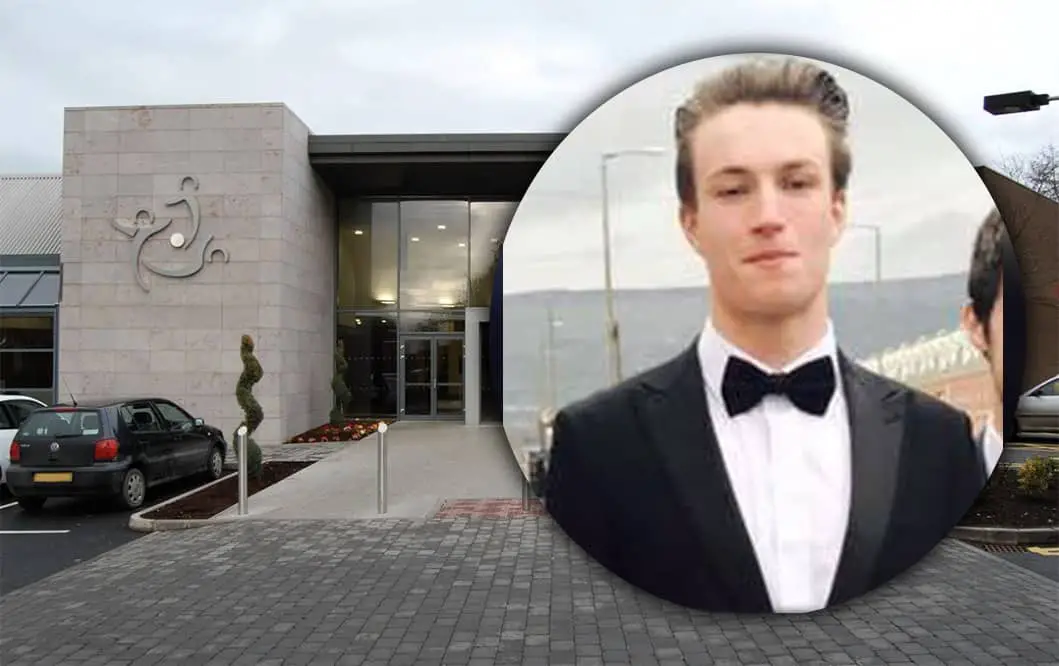An “athletic” young man who tragically died after he suffered a hypoxic blackout at the bottom of a leisure centre pool in Armagh was himself a qualified lifeguard, a jury heard today (Monday).
The Newry Crown Court jury of four men and eight woman also heard that just a few weeks after Christopher Rogers tragically died, Armagh City, Banbridge & Craigavon Council changed the guidance given the lifeguards about underwater swimming and people holding their breath underwater.
On trial each facing a single count that being employee, they were in breach their duty to others on April 7, 2017 in that they “failed to take reasonable care for the health and safety of other persons who may be affected by your acts or omissions at work” are:
Cathal Forrest-McVeigh (35), from Dunamony Road in Dungannon;William Holden (26), from Unshinagh Lane in Portadown andJames Monaghan (26), from Folly Lane in Armagh.
When the trial was formally opened last Thursday, the jury heard how 20-year-old Mr Rogers had swam two and a half lengths of the Orchard Leisure Centre pool underwater when he broke the surface and then “sank to the bottom of the pool” where he remained for five minutes and 14 seconds.
Prosecuting KC Liam McCollum outlined that during that time Holden had been in the high chair at one side of the pool while McVeigh and Monaghan had been “engaged in conversation” for two minutes and twenty seconds as the guard duty rotated.
Mr McCollum told the jury that while five minutes may not seem like a long time if for instance “you are waiting on a bus…you might consider, we say, that for someone to be at the bottom of a pool, not emerging, five minutes and 14 seconds is a very, very long time.”
Concluding his opening statement Mr McCollum suggested to the jury that “their job was to guard lives…their job was to be vigilant for the safety of everybody who was swimming in the pool.”
“The prosecution say that self-evidently, they did not do this job properly because a very long period of time passed between Mr Rogers hitting the bottom of the pool and any rescue attempt,” the senior barrister argued.
The jury have also heard that a short time before he was rescued from the pool, Mr Rogers had given a fellow swimmer a “thumbs up sign” and that the lifeguards were aware of what the deceased was doing.
In court today (mon), the jury heard evidence from Paul Murphy who told them that at the time, his job at the centre was a full time swimming instructor as well as training and assessing the lifeguards.
He told prosecuting KC Geraldine McCullough the lifeguards had to undergo weekly to monthly training sessions, depending whether they were full time or part time and that their training was based on guidance from the Royal Life Saving Society book.
Outlining that the RLSS syllabus is revised and amended every 18-24 months, Mr Murphy said at the time there was reference no underwater swimming but none to “shallow water blackout.”
Asked whether he knew Mr Rogers the witness confirmed he did and further that he was aware of and had seen “once or twice” the type of training he was doing where either swam lengths underwater or “remained stationary holding his breath under the water.”
“I think one or two of the lifeguards spoke to him about it,” he told the jury.
Under cross examination from Gavan Duffy, defence KC for McVeigh, Mr Murphy agreed that in 2017 “lifeguards were not receiving training in shallow water blackout.”
He also agreed that after Mr Rogers’ tragic death, there was a policy change for pools across the council area in that swimmers were not allowed to swim for more than 15 metres underwater.
The jury also heard evidence from Doris Sherry who at the time was the duty officer at Orchard Leisure Centre and she told them she was in charge of staff induction so they were aware of and knew both the Normal Operating Procedures and Emergency Action Plan.
Part of those documents referred to lifeguards identifying potential hazards in the pool and during Mr Duffy’s cross examination, she agreed “there is no mention of shallow water blackout.”
She further agreed that at the time, the RLSS book which was the basis for pool lifeguard training “does not mention shallow water blackout or hypoxic blackout or anything like that.”
Confirming that she knew the “athletic” and “prolific swimmer” Mr Rogers as he regularly used the pool and from seeing him cycling in the area, Ms Sherry also confirmed that “he was a lifeguard…and would have received the same standard training” as the defendants in assessing potential dangers and hazards.
Introducing council documents dated May 2017, Gary McHugh suggested there was a “completely new policy from the council” which advised lifeguards to be aware of pool users engaged in underwater swimming and “prolonged periods of breath holding at any depth.”
The senior barrister outlined how the guidance told lifeguards “they should intervene and request that pool users refrain from these activities and advise the swimmer of the dangers.”
“That’s a brand new policy isn’t it,” Mr McHugh asked and Ms Sherry agreed “to my knowledge yes.”
He also told the court that “in bold and underlined to doubly emphasise the point,” the revised guidance as of May 2017 told lifeguards that when a pool user was already under the water “they should effect a rescue immediately.”
“These are all new policies that were put in force as a direct result of Mr Roger’s tragedy, does that seem fair,” Mr McHugh asked her and Ms Murphy agreed “yes.”
The trial continues.
At hearing.
